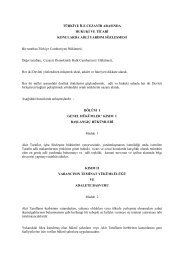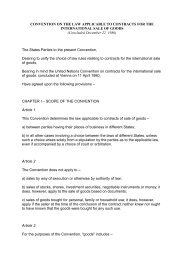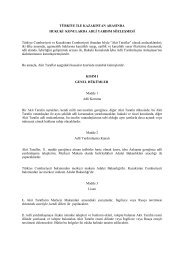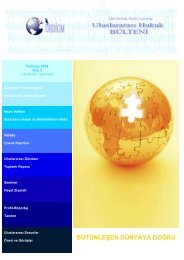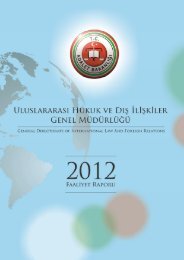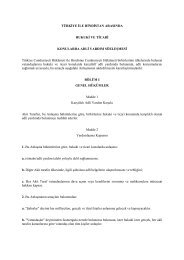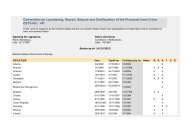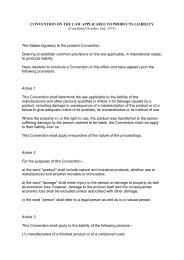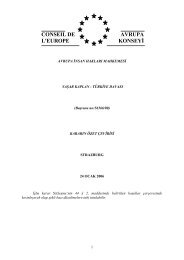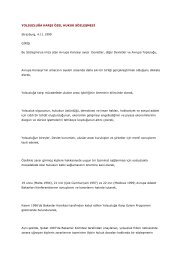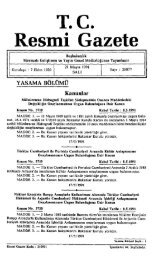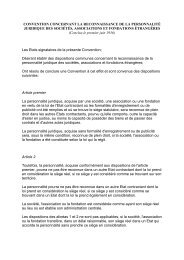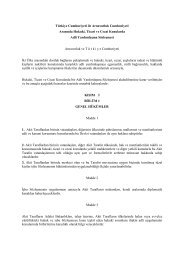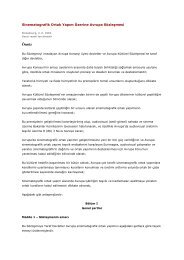SECOND SECTION CASE OF ÜRPER AND OTHERS v. TURKEY ...
SECOND SECTION CASE OF ÜRPER AND OTHERS v. TURKEY ...
SECOND SECTION CASE OF ÜRPER AND OTHERS v. TURKEY ...
- No tags were found...
Create successful ePaper yourself
Turn your PDF publications into a flip-book with our unique Google optimized e-Paper software.
<strong>SECOND</strong> <strong>SECTION</strong><strong>CASE</strong> <strong>OF</strong> <strong>ÜRPER</strong> <strong>AND</strong> <strong>OTHERS</strong> v. <strong>TURKEY</strong>(Applications nos. 14526/07, 14747/07, 15022/07, 15737/07, 36137/07,47245/07, 50371/07, 50372/07 and 54637/07)JUDGMENTSTRASBOURG20 October 2009FINAL20/01/2010This judgment will become final in the circumstances set out in Article 44 § 2 of theConvention. It may be subject to editorial revision.
<strong>ÜRPER</strong> <strong>AND</strong> <strong>OTHERS</strong> v. <strong>TURKEY</strong> JUDGMENT 1In the case of Ürper and Others v. Turkey,The European Court of Human Rights (Second Section), sitting as aChamber composed of:Françoise Tulkens, President,Ireneu Cabral Barreto,Vladimiro Zagrebelsky,Dragoljub Popović,Nona Tsotsoria,Işıl Karakaş,Kristina Pardalos, judges,and Sally Dollé, Section Registrar,Having deliberated in private on 29 September 2009,Delivers the following judgment, which was adopted on that date:PROCEDURE1. The case originated in nine applications (nos. 14526/07, 14747/07,15022/07, 15737/07, 36137/07, 47245/07, 50371/07, 50372/07and 54637/07) against the Republic of Turkey lodged with the Court underArticle 34 of the Convention for the Protection of Human Rights andFundamental Freedoms (“the Convention”) by twenty-six Turkish nationals(“the applicants”), whose names appear in the appendix.2. The applicants were represented by Mr Ö. Kılıç, a lawyer practisingin Istanbul. One of the applicants, Mr Hüseyin Bektaş, was granted legalaid. The Turkish Government (“the Government”) were represented by theirAgent.3. On 29 March, 2, 3 and 5 April, 9 August, 17 October,5 and 19 November and 6 December 2007, the applicants' representativerequested that the respondent Government be notified of the introduction ofthe applications in accordance with Rule 40 of the Rules of Court and thatthe cases be given priority under Rule 41. On 14 May, 14 September and27 November 2007 and 10 January 2008, the President of the SecondSection decided that the applications should be given priority under Rule 41of the Rules of Court. She further decided that the respondent Governmentshould be notified of the introduction of applications nos. 14526/07,14747/07, 15022/07, 15737/07 and 36137/07, and be requested to submitinformation about, inter alia, the outcome of the case before theConstitutional Court concerning section 6(5) of Law no. 3713 (paragraph 13below).4. On 12 February 2008 the Court decided to give notice of theapplications to the Government. It also decided to examine the merits of theapplications at the same time as their admissibility (Article 29 § 3).
2 <strong>ÜRPER</strong> <strong>AND</strong> <strong>OTHERS</strong> v. <strong>TURKEY</strong> JUDGMENTTHE FACTSI. THE CIRCUMSTANCES <strong>OF</strong> THE <strong>CASE</strong>1. The prosecution of the newspapers5. At the material time the applicants were the owners, executivedirectors, editors-in-chief, news directors and journalists of four dailynewspapers published in Turkey: Ülkede Özgür Gündem, Gündem, Günceland Gerçek Demokrasi. The publication of all four newspapers wasregularly suspended, pursuant to section 6(5) of Law no. 3713 (thePrevention of Terrorism Act), by various Chambers of the Istanbul AssizeCourt, between 16 November 2006 and 25 October 2007, for periodsranging from 15 days to a month in respect of various news reports andarticles. The impugned publications were deemed to be propaganda infavour of a terrorist organisation, the PKK/KONGRA-GEL 1 , as well as theapproval of crimes committed by that organisation and its members.6. In the first case against Ülkede Özgür Gündem on 16 November 2006,the trial judge considered that the content of certain reports and articlescontained elements of propaganda, the approval of terrorist crimes and hadidentified officials who risked terrorist attack, contrary to section 6(5) ofLaw no. 3713. Their content thus exceeded the permissible limits ofArticle 10 of the Convention. Moreover, the offences had not been limitedto a single issue of the newspaper, but had been continuous. Consequently,he was authorised by section 6(5) to suspend the publication anddistribution of the periodical for a period of fifteen days to a month.7. In the case against Güncel on 16 July 2007, the newspaper wassuspended for 15 days, not by virtue of section 6(5) of Law no. 3713, butbecause its owners, journalists and content were the same as those ofGündem, whose publication and distribution had been suspended for15 days by a court decision of 12 July 2007.8. Neither the applicants nor their representative participated in these exparte procedures, and their written objections to the suspension orders weredismissed. Consequently, the orders were executed.2. The prosecution of the applicants9. The applicant Ali Gürbüz, the owner of Ülkede Özgür Gündem, wasprosecuted under sections 6(1) and (2) and 7(2) of Law no. 3713, as wellas Article 215 of the Criminal Code, for disseminating propaganda in favourof the aforementioned organisation, approving crimes committed by that1. Kurdistan Workers’ Party, an illegal organisation.
<strong>ÜRPER</strong> <strong>AND</strong> <strong>OTHERS</strong> v. <strong>TURKEY</strong> JUDGMENT 3organisation and its members, and identifying officials with anti-terroristduties as targets, in respect of various articles published in their newspaper(case no. 2007/367). Ali Gürbüz was convicted and fined 380,000 newTurkish liras (TRY) (approximately 217,000 euros (EUR)).10. The applicant Özlem Aktan, the executive director of Ülkede ÖzgürGündem and Gündem, was similarly prosecuted. Her first case concerningthe former newspaper was disjoined from that of Ali Gürbüz. Her secondcase (no. 2007/197) involved another applicant, Lütfi Ürper, the owner ofGündem and Güncel. They were charged under sections 5, 6(2) and (4) and7(2) of Law no. 3713, as well as Articles 215 and 218 of the Criminal Code.Lütfi Ürper was prosecuted on three other occasions on similar charges(case nos. 2007/419, 2007/343 and 2007/482). Another applicant,Hüseyin Bektaş, the owner and executive director of Gerçek Demokrasi,was prosecuted for the same offences under sections 6(2) and 7(2) ofLaw no. 3713 and Article 215 of the Criminal Code.11. According to the information in the case file, all these prosecutionsare still pending at first instance, except for that against Ali Gürbüz, whichis apparently still pending before the Court of Cassation.II. RELEVANT DOMESTIC LAW12. Article 28 of the Constitution of Turkey reads as follows:“The press is free and shall not be censored. The establishment of a publishingcompany shall not be subject to prior permission or the deposit of a financialguarantee.The State shall take the necessary measures to ensure freedom of the press andfreedom of information.As regards restrictions on freedom of the press, Articles 26 and 27 of theConstitution are applicable.Anyone who writes or prints any news or articles which threaten the internal orexternal security of the State or the indivisible integrity of the State with its territoryand nation, which are aimed at inciting offences, riot or insurrection, or which refer toclassified State secrets, and anyone who prints or transmits such news or articles toothers for the above purposes, shall be held responsible under the law governing theseoffences. Distribution may be suspended as a preventive measure by the decision of ajudge or, in the event that delay is deemed prejudicial, by the competent authoritydesignated by law. The authority suspending distribution shall notify a competentjudge of its decision within twenty-four hours. The order suspending distribution shallbecome null and void unless upheld by a competent judge within forty-eight hours.No ban shall be placed on the reporting of events except by a judge's decisiondesigned to ensure the proper functioning of the judiciary, within the limits specifiedby law.
4 <strong>ÜRPER</strong> <strong>AND</strong> <strong>OTHERS</strong> v. <strong>TURKEY</strong> JUDGMENTPeriodical and non-periodical publications may be seized by the decision of a judgein the event of an ongoing investigation into or prosecution of offences prescribed bylaw and, in situations where a delay could endanger the indivisible integrity of theState with its territory and nation, national security, public order or public morals, andfor the prevention of an offence, by order of the competent authority designated bylaw. The authority issuing the order to confiscate shall notify a competent judge of itsdecision within twenty-four hours. The order to confiscate shall become null and voidunless upheld by the competent court within forty-eight hours.The general common provisions shall apply to the seizure and confiscation ofperiodicals and non-periodicals for the purposes of criminal investigation andprosecution.Publication of periodicals published in Turkey may be temporarily suspended byorder of the courts in the event of a criminal conviction on account of their containingmaterial which undermines the indivisible integrity of the State with its territory andnation, the fundamental principles of the Republic, national security and publicmorals. Any publication which is clearly a continuation of a suspended periodicalshall be prohibited and shall be seized following a decision by a competent judge.”13. The relevant provisions of the Prevention of Terrorism Act(Law no. 3713), amended by Law no. 5532, which entered into force on18 July 2006, read as follows:Section 6“1. It shall be an offence, punishable by a term of imprisonment of one to threeyears, to announce, orally or in the form of a publication, that terrorist organisationswill commit an offence against a specific person, whether or not that person's ...identity is divulged, provided that it is done in such a manner that he or she may beidentified, or to reveal the identity of civil servants who have participated in antiterroristoperations or to designate any person as a target.2. It shall be an offence, punishable by a term of imprisonment of one tothree years, to print or publish declarations or leaflets emanating from terroristorganisations....4. If any of the offences defined in the paragraphs above are committed through thepress or the media, the owners and editors-in-chief of the press and media organsconcerned who did not participate in the commission of the offence shall also be liableto a judicial fine equivalent to between a thousand and ten thousand days'imprisonment. However, the maximum limit of this punishment shall be theequivalent of five thousand days for editors-in-chief.5. Periodicals whose content openly encourages the commission of offences withinthe framework of the activities of a terrorist organisation, approves of the offencescommitted by a terrorist organisation or its members or constitutes propaganda infavour of the terrorist organisation may be suspended for a period of fifteen days toone month as a preventive measure by decision of a judge or, if a delay is detrimental,on an instruction from a public prosecutor. The public prosecutor shall notify the
<strong>ÜRPER</strong> <strong>AND</strong> <strong>OTHERS</strong> v. <strong>TURKEY</strong> JUDGMENT 5judge of such instruction within twenty-four hours. If the judge does not approve thedecision within forty-eight hours, the instruction to suspend publication shall becomenull and void.”On 3 March 2006 the former President of Turkey lodged a case with theConstitutional Court (case no. 2006/121) challenging the validity of section6(5) of Law no. 3713. It had been argued, inter alia, that this section hadcreated an unconstitutional penalty. On 18 June 2009 the ConstitutionalCourt dismissed the case (decision no. 2009/90).Section 7(2)“Any person who disseminates propaganda in favour of a terrorist organisation shallbe liable to a term of imprisonment of one to five years. Where this offence iscommitted through the press or the media, the sentence shall be increased by half.Moreover, the owners and editors-in-chief of the press and media organs concernedwho did not participate in the commission of the offence shall also be liable to ajudicial fine equivalent to between one thousand and ten thousand days'imprisonment. However, the maximum limit of this punishment shall be theequivalent of five thousand days for editors-in-chief.”14. The relevant provisions of the Criminal Code (Law no. 5237) read asfollows:Article 39“(1) A person who abets commission of an offence shall be liable to a term ofimprisonment of fifteen to twenty years if the offence is punishable by an aggravatedlife sentence and ten to fifteen years where the offence is punishable by a lifesentence. Punishment is reduced by half in all other circumstances. However, in thelatter case the punishment cannot exceed eight years.(2) A person is deemed to have abetted commission of an offence in the followingcircumstances:(a) Encouragement to commit an offence...”Article 215“Any person who approves of an offence committed, or praises a person on accountof an offence he or she has committed, shall be liable to a term of imprisonment of upto two years.”Article 218“Where one of the offences proscribed by Articles 213-217 is committed throughthe press or the media, the sentence shall be increased by half.”
6 <strong>ÜRPER</strong> <strong>AND</strong> <strong>OTHERS</strong> v. <strong>TURKEY</strong> JUDGMENTTHE LAWI. JOINDER15. Having regard to the similar subject matter of the applications, theCourt finds it appropriate to join them.II. ADMISSIBILITYA. The alleged lack of victim status16. The Government submitted that the editors-in-chief, news directorsand journalists of Ülkede Özgür Gündem, Gündem, Güncel and GerçekDemokrasi did not have any victim status as they had not been directlyaffected by the decisions to suspend the publication of these newspapers.They maintained that only the owners and the executive directors of thesenewspapers, namely the applicants Ali Gürbüz, Özlem Aktan, Lütfi Ürperand Hüseyin Bektaş, could claim to be victims of the alleged violations ofthe Convention.17. Referring to the Court's decision in the case of Yıldız and Othersv. Turkey ((dec.), no. 60608/00, 26 April 2005)) and to the judgment in thecase of Halis Doğan and Others v. Turkey (no. 50693/99, 10 January 2006),the applicants submitted that they had all been affected by the court orders.18. The Court notes that it has already examined and rejected similarobjections by the Government in previous cases (see Tanrıkulu, Çetin,Kaya and Others v. Turkey (dec.), nos. 40150/98, 40153/98 and 40160/98,6 November 2001; Yıldız and Others, cited above). The Court finds noparticular circumstances in the instant case which would require it to departfrom this jurisprudence. It considers that the exercise of the freedom toreceive and impart information of the editors-in-chief, news directors andjournalists was directly affected by the decisions suspending the publicationand distribution of the four newspapers. The Court accordingly rejects theGovernment's objection.B. The alleged failure to exhaust domestic remedies19. The Government next argued that the applicants should have awaitedthe outcome of the criminal proceedings brought against the owners and theexecutive directors of the newspapers before lodging their applications.20. The applicants submitted that their Convention grievances did notconcern the aforementioned criminal proceedings but the decisions of the
<strong>ÜRPER</strong> <strong>AND</strong> <strong>OTHERS</strong> v. <strong>TURKEY</strong> JUDGMENT 7national courts suspending the publication of the newspapers. They furthercontended that they had exhausted all domestic remedies available to themin the context of the suspension orders.21. The Court notes that the applicants' complaints under the Conventionsolely relate to the assize courts' decisions suspending the publication ofÜlkede Özgür Gündem, Gündem, Güncel and Gerçek Demokrasi, and thatthe applicants had exhausted domestic remedies by filing objections to thevarious decisions. It therefore finds that the applicants have exhausted thedomestic remedies available to them within the meaning of Article 35 § 1 ofthe Convention. The Court accordingly rejects the Government's objection.C. Compliance with other admissibility criteria22. The Court observes that the applications are not manifestlyill-founded within the meaning of Article 35 § 3 of the Convention. Itfurther notes that they are not inadmissible on any other grounds. They musttherefore be declared admissible.III. MERITSA. Alleged violations of Article 10 of the Convention23. The applicants alleged under Article 10 of the Convention that thesuspension of the publication and distribution of Ülkede Özgür Gündem,Gündem, Güncel and Gerçek Demokrasi, which was based on section 6(5)of Law no. 3713, constituted an unjustified interference with their freedomof expression.Article 10 reads insofar as relevant as follows:“1. Everyone has the right to freedom of expression. This right shall includefreedom to hold opinions and to receive and impart information and ideas withoutinterference by public authority and regardless of frontiers. ...2. The exercise of these freedoms, since it carries with it duties and responsibilities,may be subject to such formalities, conditions, restrictions or penalties as areprescribed by law and are necessary in a democratic society, in the interests ofnational security, territorial integrity or public safety, for the prevention of disorder orcrime, for the protection of health or morals, [and] for the protection of the reputationor rights of others, ...”1. Whether there was interference24. In the Court's view, the decisions suspending the publication anddistribution of Ülkede Özgür Gündem, Gündem, Güncel and GerçekDemokrasi amounted to “interferences” with the exercise of the applicants'
8 <strong>ÜRPER</strong> <strong>AND</strong> <strong>OTHERS</strong> v. <strong>TURKEY</strong> JUDGMENTfreedom of expression. This, moreover, has not been disputed by theGovernment.25. Such interferences will be in breach of Article 10 unless they fulfilthe requirements of paragraph 2 of that Article. It therefore remains to bedetermined whether the interferences were “prescribed by law”, pursuedlegitimate aims and were “necessary in a democratic society” in order toachieve them.2. Whether the interferences were prescribed by law26. The Government submitted that the decisions banning thepublication of the newspapers had been prescribed by section 6(5) of Lawno. 3713.27. The applicants contended that section 6(5) of the Prevention ofTerrorism Act was not law as it was in violation of the Constitution and theConvention. In this connection, they noted that the former President ofTurkey had brought a case before the Constitutional Court seeking theannulment of the said section 6(5), since he rightly considered that thisprovision had created a penalty which did not exist in the Constitution ofTurkey (paragraph 13 above). They also submitted that the decision of16 July 2007 suspending the publication and distribution of Güncel had notbeen based on any domestic legal provision.28. The Court reiterates that the expression “prescribed by law”, withinthe meaning of Article 10 § 2, requires firstly that the impugned measureshould have some basis in domestic law. However, it also refers to thequality of law, which requires that legal norms should be accessible to theperson concerned, their consequences foreseeable and their compatibilitywith the rule of law ensured (see, among others, Association Ekin v. France,no. 39288/98, § 44, ECHR 2001-VIII).29. In the present case it is not disputed that most of the national courts'decisions were based on section 6(5) of Law no. 3713. There remains thequestion of the latter's accessibility and foreseeability, as well as itscompatibility with the rule of law. Moreover, one such decision on 16 July2007 suspending the publication and distribution of Güncel (paragraph 7above) was not based on this provision, but on a cross reference to the factthat the owner, journalists and content of Güncel were the same as those ofGündem, whose publications had previously been suspended. However, therelevant provision of Law no. 3713 does not envisage the suspension of aperiodical on that basis. Therefore, the Court has serious doubts as towhether the decision of 16 July 2007 was soundly grounded in domesticlaw. Nevertheless, having regard to its findings below on the necessityquestion (see paragraph 45), the Court considers that it is not required toreach a final conclusion on this “lawfulness” issue.
<strong>ÜRPER</strong> <strong>AND</strong> <strong>OTHERS</strong> v. <strong>TURKEY</strong> JUDGMENT 93. Whether the interferences pursued a legitimate aim30. The Government submitted that the decisions banning thepublication of the newspapers had pursued several legitimate aims, namelythe protection of national security, territorial integrity and public safety, aswell as the prevention of disorder and the protection of the reputation andrights of others.31. The applicants maintained that measures could only have been takento restrict freedom of expression for the prevention of disorder and crime.32. The Court is of the opinion that in the present case the nationalauthorities may be considered to have pursued the legitimate aim ofpreventing disorder and crime. The Court nevertheless considers that thisissue is inextricably linked to the necessity in a democratic society ofsuspending the future publication of the newspapers, and therefore shouldbe examined within that context.4. Whether the interferences were necessary in a democratic societya. The parties' submissions33. The Government maintained that the national judges had found thatthe articles in question had contained elements of propaganda in favour of aterrorist organisation and the approval of crimes committed by thatorganisation. Moreover, they had disclosed the identity of officials withanti-terrorist duties, thus making them targets for terrorist attack. TheGovernment contended that the decisions banning the publication of thenewspapers had constituted preventive measures applied for limited periodsof time and had met a pressing social need. Therefore, the interferences withthe applicants' rights had been proportionate to the legitimate aims pursuedand the reasons adduced by the authorities were relevant and sufficient.34. The applicants maintained that, had the national courts intended totake proportionate measures, they could have confiscated the issues whosepublication had allegedly broken the law. They claimed that the ban on thepublication of the newspapers as a whole, whose future content wasunknown at the time of the national courts' decisions, for such lengthyperiods, had constituted censorship.b. The Court's assessment(i) General Principles35. The Court reiterates that freedom of expression constitutes one of theessential foundations of a democratic society and one of the basicconditions for its progress and for individual self-fulfilment (see Lingensv. Austria, 8 July 1986, § 41, Series A no. 103). Although freedom ofexpression may be subject to exceptions, these must be narrowly interpreted
10 <strong>ÜRPER</strong> <strong>AND</strong> <strong>OTHERS</strong> v. <strong>TURKEY</strong> JUDGMENTand the necessity for any restriction must be convincingly established (seeObserver and Guardian v. the United Kingdom, 26 November 1991, § 59,Series A no. 216). Nevertheless, it is in the first place for the nationalauthorities to assess whether there is a “pressing social need” for therestriction and, in making their assessment, they enjoy a certain margin ofappreciation. In cases, such as the present one, concerning the writtenmedia, the national margin of appreciation is circumscribed by the interestsof a democratic society in ensuring and maintaining a free press (seeFressoz and Roire v. France [GC], no. 29183/95, § 45, ECHR 1999-I;Alınak v. Turkey, no. 40287/98, § 36, 29 March 2005).36. The press plays an essential role in a democratic society. The Courthas stated on several occasions that, although the press must not overstepthe bounds required, for example, to provide protection against threats ofviolence, disorder or crime, its duty is nevertheless to impart – in a mannerconsistent with its obligations and responsibilities – information and ideason all matters of public interest, including divisive ones (see, for example,Şener v. Turkey, no. 26680/95, § 41, 18 July 2000; Sürek v. Turkey (no. 1)[GC], no. 26682/95, § 59, ECHR 1999-IV). Not only does the press havethe task of imparting such information and ideas, but the public also has aright to receive them (see Bladet Tromsø and Stensaas v. Norway [GC],no. 21980/93, § 62, ECHR 1999-III).(ii) Application of the above principles to the present case37. The Court observes, at the outset, that the publication anddistribution of four newspapers, Ülkede Özgür Gündem, Gündem, Günceland Gerçek Demokrasi, were suspended for periods ranging from fifteendays to a month by different chambers of the Istanbul Assize Court. Thesuspension orders were made as the first-instance courts considered thatcertain articles and news reports which had been published in differentissues of these newspapers contained elements of propaganda in favour of aterrorist organisation, the PKK/KONGRA-GEL, as well as the approval ofcrimes committed by that organisation and its members, whilst at the sametime disclosing the identity of officials with anti-terrorist duties, thusmaking them targets for terrorist attack. The applicants lodged unsuccessfulobjections to these suspension orders each time.38. The Court considers that it is not necessary to examine the content ofthe impugned articles and news reports as the applicants' complaints in thepresent case do not concern the confiscation of particular issues, but thedecisions banning the publication of the newspapers as a whole for periodsof fifteen days to a month on the ground that the offences mentioned insection 6(5) of Law no. 3713 had been committed by way of publication ofarticles and news reports.39. The Court reiterates in this connection that Article 10 of theConvention does not, in terms, prohibit the imposition of prior restraints on
<strong>ÜRPER</strong> <strong>AND</strong> <strong>OTHERS</strong> v. <strong>TURKEY</strong> JUDGMENT 11publication. However, the dangers inherent in prior restraints are such thatthey call for the most careful scrutiny on the part of the Court. This isespecially so as far as the press is concerned, for news is a perishablecommodity and to delay its publication, even for a short period, may welldeprive it of all its value and interest (see Observer and Guardian, citedabove, § 60). As freedom of the press was at stake, the national authoritieshad only a limited margin of appreciation to decide whether there was a“pressing social need” to take the measures in question (Editions Plonv. France, no. 58148/00, § 44, ECHR 2004-IV).40. The Court acknowledges that the judicial character of the systemgoverning the suspension of the publication of the newspapers was avaluable safeguard of freedom of the press. However, the decisions given bythe national courts in this area must also conform to the principles ofArticle 10 of the Convention (see Gawęda v. Poland, no. 26229/95, § 47,ECHR 2002-II).41. In this connection, the Court observes that the Istanbul AssizeCourt's decisions entailed bans on future publication of entireperiodicals. The Court observes that it has already had occasion to considerapplications which concerned prior restraints on the media (see for exampleObserver and Guardian, cited above; Sunday Times v. the United Kingdom(no. 2), 26 November 1991, Series A no. 217) and held that they were notper se incompatible with the Convention.42. The present applications are however distinguishable from theseearlier cases because the restraints now under scrutiny were not imposed onparticular types of news reports or articles, but on the future publication ofentire newspapers, whose content was unknown at the time of the nationalcourt's decisions.43. In the Court's view, both the content of section 6(5) of Law no. 3713and the judges' decisions in the instant case stem from the hypothesis thatthe applicants, whose “guilt” was established without trial in proceedingsfrom which they were excluded, would re-commit the same kind of offencesin the future. The Court finds, therefore, the preventive effect of thesuspension orders entailed implicit sanctions on the applicants to dissuadethem from publishing similar articles or news reports in the future, andhinder their professional activities (see, mutatis mutandis, Demirel and Ateşv. Turkey (no. 3), no. 11976/03, § 28, 9 December 2008). However, theCourt considers that less draconian measures could have been envisaged,such as the confiscation of particular issues of the newspapers or restrictionson the publication of specific articles.44. The Court concludes that by suspending the publication anddistribution of Ülkede Özgür Gündem, Gündem, Güncel andGerçek Demokrasi, albeit for short periods, the domestic courts largelyoverstepped the narrow margin of appreciation afforded to them andunjustifiably restricted the essential role of the press as a public watchdog in
12 <strong>ÜRPER</strong> <strong>AND</strong> <strong>OTHERS</strong> v. <strong>TURKEY</strong> JUDGMENTa democratic society (see, mutatis mutandis, Cumpănă and Mazărev. Romania, no. 33348/96, § 119, 10 June 2003; Obukhova v. Russia,no. 34736/03, § 28, 8 January 2009). The practice of banning the futurepublication of entire periodicals on the basis of section 6(5) ofLaw no. 3713 went beyond any notion of “necessary” restraint in ademocratic society and, instead, amounted to censorship.45. There has accordingly been a violation of Article 10 of theConvention.B. Alleged violations of Articles 6 and 13 of the Convention andArticle 1 of Protocol No. 1 to the Convention46. The applicants complained under Article 6 §§ 1 and 3 of theConvention that they were not able to participate in the proceedings beforethe Istanbul Assize Court and that the latter had decided to suspendpublication and distribution of the aforementioned newspapers withoutobtaining their submissions in defence. They further contended underArticle 13 of the Convention that they had not had a domestic remedy bywhich to challenge the lawfulness of the national court decisions, as theirobjections to the suspension orders had been dismissed without trial. Theapplicants also complained under Article 6 § 2 that these orders had violatedtheir right to be presumed innocent, since the national courts had held thatcriminal offences had been committed through the publication of newsreports and articles in the aforementioned newspapers, for which they hadbeen responsible.47. Lastly, the applicants complained under Article 1 of Protocol No. 1that the decisions to suspend the publication of Ülkede Özgür Gündem,Gündem, Güncel and Gerçek Demokrasi had constituted an unjustifiedinterference with their right to property.48. The Government contested these allegations.49. However, having regard to the circumstances of the case and to itsfinding of a violation of Article 10 of the Convention above (paragraph 45),the Court considers that it has examined the main legal question raised inthe present application. It concludes therefore that there is no need to makeseparate rulings in respect of these other complaints (see, mutatis mutandis,Demirel and Others v. Turkey, no. 75512/01, § 27, 24 July 2007; Demireland Ateş, cited above, § 37).IV. APPLICATION <strong>OF</strong> ARTICLES 46 <strong>AND</strong> 41 <strong>OF</strong> THE CONVENTIONA. Article 46 of the Convention50. Article 46 of the Convention reads as follows:
<strong>ÜRPER</strong> <strong>AND</strong> <strong>OTHERS</strong> v. <strong>TURKEY</strong> JUDGMENT 15respectively, EUR 40,000, EUR 5,000 and EUR 10,000 for pecuniarydamage.b. Non-pecuniary damage59. The applicants claimed EUR 162,000 in total in respect ofnon-pecuniary damages.60. The Government asked the Court to dismiss this claim, as the findingof a violation would in itself constitute sufficient compensation.61. The Court considers that all the applicants may be deemed to havesuffered a certain amount of distress and frustration, which cannot besufficiently compensated by the finding of a violation alone. Taking intoaccount the particular circumstances of the case and the type of violationfound, the Court awards the applicants EUR 1,800 each for non-pecuniarydamage.2. Costs and expenses62. The applicants also claimed EUR 23,960 for the costs and expensesincurred before the domestic courts and for those incurred before the Court.In this connection they submitted time sheets indicating the time spent bytheir legal representative regarding the applications, as well as tables ofcosts and expenditures.63. The Government contested this claim.64. According to the Court's case-law, an applicant is entitled to thereimbursement of costs and expenses only in so far as it has been shownthat these have been actually and necessarily incurred and were reasonableas to quantum. In the present case, regard being had to the documents in itspossession and the above criteria, the Court considers it reasonable to awardthe applicants, jointly, the sum of EUR 5,000, for their costs before theCourt, less the EUR 1,000 which Hüseyin Bektaş received in legal aid fromthe Council of Europe for his representation in application no. 54637/07.3. Default interest65. The Court considers it appropriate that the default interest should bebased on the marginal lending rate of the European Central Bank, to whichshould be added three percentage points.FOR THESE REASONS, THE COURT1. Decides to join the applications;2. Declares the applications admissible;
16 <strong>ÜRPER</strong> <strong>AND</strong> <strong>OTHERS</strong> v. <strong>TURKEY</strong> JUDGMENT3. Holds that there has been a violation of Article 10 of the Convention;4. Holds that there is no need to examine separately the complaints underArticles 6 and 13 of the Convention and Article 1 of Protocol No. 1;5. Holds(a) that the respondent State is to pay the applicants within three monthsfrom the date on which the judgment becomes final in accordance withArticle 44 § 2 of the Convention, the following amounts to be convertedinto Turkish liras at the rate applicable at the date of settlement:(i) EUR 40,000 (forty thousand euros) to Lütfi Ürper, EUR 5,000(five thousand euros) to Ali Gürbüz and EUR 10,000 (ten thousandeuros) to Hüseyin Bektaş in respect of pecuniary damage;(ii) EUR 1,800 (one thousand eight hundred euros) to eachapplicant - Lütfi Ürper, Nurettin Fırat, Özlem Aktan, Yüksel Genç,Bayram Balcı, Abdulvahap Taş, Mehmet Ali Çelebi, CengizKapmaz, Devrim Göktaş, Filiz Koçali, Fuat Bulut, Hüseyin Aykol,Salih Sezgi, Zeriman Dağdelen, Ramazan Pekgöz, Medine Kılıç,Mehmet Samur, Ali Gürbüz, Ali Erden, Ersin Öngel, Musa Demir,Esra Çiftçi, Turabi Kişin, Şinasi Tur, Zennur Kızılkaya, HüseyinBektaş - in respect of non-pecuniary damage, plus any tax that maybe chargeable;(iii) EUR 5,000 (five thousand euros), to the applicants, jointly, inrespect of costs and expenses, less EUR 1,000 (one thousandeuros), granted by way of legal aid, plus any tax that may bechargeable to them;(b) that from the expiry of the above-mentioned three months untilsettlement simple interest shall be payable on the above amounts at arate equal to the marginal lending rate of the European Central Bankduring the default period plus three percentage points;6. Dismisses the remainder of the applicants' claim for just satisfaction.Done in English, and notified in writing on 20 October 2009, pursuant toRule 77 §§ 2 and 3 of the Rules of Court.Sally DolléRegistrarFrançoise TulkensPresident
<strong>ÜRPER</strong> <strong>AND</strong> <strong>OTHERS</strong> v. <strong>TURKEY</strong> JUDGMENT 17AppendixFile No Case Name Date of lodging Introduced by14526/07 <strong>ÜRPER</strong> and Othersv. Turkey2 April 2007 Lütfi Ürper, Nurettin Fırat, ÖzlemAktan and Yüksel Genç14747/07 BALCI and Others 3 April 2007 Bayram Balcı, Abdulvahap Taş,v. TurkeyMehmet Ali Çelebi, Cengiz Kapmaz,15022/07 BALCI and Othersv. Turkey15737/07 GÜRBÜZ andOthers v. Turkey36137/07 <strong>ÜRPER</strong> and Othersv. Turkey47245/07 <strong>ÜRPER</strong> and othersv. TurkeyDevrim Göktaş and Filiz Koçali5 April 2007 Bayram Balcı, Abdulvahap Taş,Mehmet Ali Çelebi, Cengiz Kapmaz,Devrim Göktaş, Fuat Bulut,Hüseyin Aykol, Salih Sezgi, ZerimanDağdelen, Ramazan Pekgöz, MedineKılıç and Mehmet Samur29 March 2007 Ali Gürbüz, Özlem Aktan, NurettinFırat and Hüseyin Aykol9 August 2007 Lütfi Ürper, Nurettin Fırat,Yüksel Genç, Bayram Balcı, HüseyinAykol, Fuat Bulut, Salih Sezgi,Zeriman Dağdelen, Mehmet Ali Çelebi,Ramazan Pekgöz, Medine Kılıç, CengizKapmaz, Mehmet Samur, Ali Erden,Ersin Öngel and Musa Demir17 October 2007 Lütfi Ürper, Nurettin Fırat,Yüksel Genç, Bayram Balcı, HüseyinAykol, Fuat Bulut, Salih Sezgi,Zeriman Dağdelen, Mehmet Ali Çelebi,Ramazan Pekgöz, Medine Kılıç,Mehmet Samur, Cengiz Kapmaz,Musa Demir, Ersin Öngel, Ali Erden,Esra Çiftçi, Turabi Kişin and Şinasi Tur50371/07 <strong>ÜRPER</strong> and others 5 November 2007 Lütfi Ürper, Mehmet Samur andv. TurkeyZennur Kızılkaya50372/07 <strong>ÜRPER</strong> and 19 November 2007 Lütfi Ürper and Mehmet SamurSAMUR v. Turkey54637/07 BEKTAŞ v. Turkey 6 December 2007 Hüseyin Bektaş



